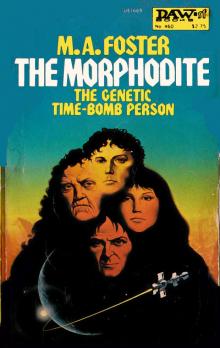- Home
- M. A. Foster
The Morphodite Page 10
The Morphodite Read online
Page 10
“How do you know I could?”
She shrugged. “I don’t know. You might work out badly—who knows? There are more women gatherers than men, why I don’t know. But you have an air about you of one worth a chance. You are an outcast, that much I can see with my own eyes, no matter which Silver City* you were a guest in; and not so much one who’d make a good little slogger, not here in Marula. No! You’ve got to snuffle up to the old bung smartly here to get along. And you’ll not do it well. Admit it.”
* Silver City: The exercise yard of a confinement camp, fenced in with a tinny-bright metal mesh, electrified, hence the slang term.
Rael found himself liking immensely this rough woman. He put his arm about her shoulders, and she did not move away. “It’s true what you say, and I admit I’m tempted to go your way…”
A noise from outside intruded on his train of thought, and interrupted his words. It was a sound of wheels, and a thudding, rhythmic compression, and a piercing little whistle, repeated at intervals. The noise grew, and then faded. Rael had never heard anything like it, but he noticed that Meliosme listened to it intently, and many others in the warehouse also listened closely to it. As the sound faded, he asked, “What was that?”
She said, quietly, “Police van. Something’s happened. Sounded like somewhere near the station… not so good.”
“Why so?” Rael whispered, so others wouldn’t hear. Meliosme sighed, “Anything happens, they sift the gatherers. We are always suspect, you know. And you and I were on the beamer. If it’s something on the train, they’ll be along presently… I guess we’ll have to wait.”
“You are not in danger…?”
“No.” But Rael suddenly thought of a pin, and that it might well be a common type used by gatherers. They had been seen together, and this was the place where gatherers congregated. He felt a sudden constriction of alarm.
“Meliosme?” He fumbled in his clothing and extracted a hidden wallet. “How much would you expect to get for your sackful, there?”
“What?”
He extracted some currency notes and showed them to her. “Take what you think the sack’s worth. I can’t explain it now, but we have to leave this place now and hide. Separately.”
For a moment she hesitated. Rael hissed, “Take it. I trusted you: now you trust me. I know danger.”
Reluctantly, she peered at the money in the dim light, at last selecting some notes, which she took and stuffed into her breast. Rael said, “I am sorry to have caused you this, but we must get out of here. And you must tell me how to get a place I can hide.”
She stood up, and Rael stood with her. She said, “I don’t know, but I’d guess you don’t want to be caught, and if they see you, they’ll know you. Did you escape?”
“In a manner of speaking… Where do we go?”
Meliosme glanced at the large sack with some regrets, and hesitated. Then she turned to him, face straight and matter-of-fact. “Come along. I know the way, and with all the coming and going, no one will notice.” She led him back to the entrance, where a group of gatherers was just coming in, and two were trying to get out, causing a confusion with which the watchman was unsuccessfully coping. In a moment, depending on the respect and good manners the gatherers showed one another, they were through the gate and into the heavy night.
Then they set off in another direction, traversing narrow ways and crossing broad streets, rapidly crossing several small districts, and the only thing Rael could tell about their route was that it seemed that they were headed away from both the station and the bazaar, to the unknown. They saw no one who looked at them twice; there were few out. But at last they came to a more habited place, a sort of neighborhood of small shops, taverns and inns, and a few walk-up dwellings. It looked rough, but far removed. Meliosme took them to a small, three-story hostel and engaged a room for them without comment, nor did the night man make any. Lisaks were as they were about their affairs, even in Marula. Night-clerks did not comment upon whom they rented rooms to.
When they had gotten the key and climbed the stairs to the room, they found it a little bare, but serviceable. And it had its own bath. Meliosme smiled at the single bed, and at the bath, and said, “Well, it’s sooner than I planned, but looks like I get my hot tub.”
Rael gently took her by the shoulders and looked in her eyes. “No. Believe me, I did not intend to have you in this; you must not stay here.”
She smiled at him, exposing white, even teeth. “No matter. This is a good hideout. They’ll never find us.”
Rael shook his head. “There is something you don’t understand, but which you must take and accept. For your life, you have to leave, and by a different way than we came in.”
“No problem there… If you didn’t want me…”
“That is the problem right now. I do want you: that is why I am telling you to leave. They will catch me. I only need to be ahead of them for about a day, and then it doesn’t matter. But you can’t stay.”
“Why?” She set her feet, preparing to stay.
“Something is going to happen to me which I will not have you see… and which will entangle you in something unimaginably bad. If you love your freedom, leave me while you can, now.”
She relaxed, incomprehension on her face. She said slowly, “Are you going to be killed… or changed?”
“I may, both. I didn’t want you in it… but I stayed because I felt good with you. But because of that I now ask you to leave and save yourself.”
“I believe you… but I don’t understand. Can you escape? Can you meet me somewhere else after this blows over?”
Rael knew he had won. He said, “I can escape, but it has to be alone. I will seek you out, no matter where you are, but I may look different. Would you still have me?”
“Would it be only the looks that changed?”
“I don’t know. I think it’s only that, if this works… Go back to the wild, tonight. Marula’s not safe for you this trip, but it will be later.”
“Would you really come looking for me?”
“I think so now.”
“You’d never find your way around Tilanque… I’ll go from here northwest, into the hills between Zolotane and Crule. You know those?”
“No better than Tilanque.”
“At any rate, it’s closer, and you can find me better, I think. I’ll go there for my next trip, work north toward the Serpentine. But how will I know you?”
“I’ll come to you and tell you who I am, what we did… or almost did.”
“Would you have?”
“I would have liked to very much… more than anything in the life I can remember.”
“Very well… Good-bye, Tiresio.”
“Good-bye, Meliosme. Good fortune to you.”
“And to you. I think you need the wish more than I.” She took his face in her hands swiftly and brushed her lips on his, ever so shortly. And then she turned quickly and left the little flat, closing the door behind her.
For a long time, Rael stood in silence and waited, counting his heartbeats, feeling the pressure of time. While he waited, he did a quick, shallow reading of circumstances, according to his art, and concluded that he probably had some time, but not as much as he had hoped to have. He breathed deeply, went to the door, opened it, and looked out. No sign of Meliosme, and the hall was quiet. Rael retreated into the flat, locked and barred the door. He looked about the room coldly. It wasn’t much. A window. A single narrow bed. A table with a washstand. A bathroom, an unheard-of luxury… Still, a shabby little room. He nodded, as if confirming something to himself. It would have to be here, then.
Rael felt hungry, but he knew that didn’t matter now. He went to the window, looked out on the street below for a few moments, and then went to the bed and wearily lay down on it, placing his hands behind his head, and staring at the dim ceiling. He thought for a long moment, considering whether he had any regrets. After some thought, he determined that there were indeed some regrets, but that they could not
make any difference. The thing would go forward, as he had both planned and dreaded.
Now he thought about what he had to do: that in itself was an odd, half-process—he knew with the certainty of long-practiced, perfected motions what he must do. The problem was that he couldn’t recall anything about what happened as a result of it, even though he knew he had done it successfully once before. Nor could he imagine it. All the same, there was a somber sense of dread, of fear, of—yes, a special kind of horror—which he felt associated with the Change. Rael knew very well that the gaps in his memory were deliberate omissions purposely installed by Pternam and friends, when he did this before. They wanted him to forget as much as possible. But now he was aware of that problem, and had found ways around it. This time, he would retain something. One never knew, safety or not as promised for Damistofia, for since when on any planet had revolutionaries ever kept their word?
He began the exercise, by relaxing, as if preparing for sleep, consciously feeling each muscle group, becoming aware of its tension, and deliberately untensing it, one by one, starting with the feet and working upward along the body. But as he felt the rhythms of sleep, he carefully shunted them aside into another state, a concentrated focus of psychic energy that seemed to magnify his self and reduce everything beyond that to a meaningless fog. He felt the brightening and the dimming of the other, and now slowly began to increase the contrast between the two, brightening the self locked somewhere behind the eyes, probably at the pineal junction, dimming the exterior, the outside, the body, everything. Sensations faded, became meaningless, and then vanished entirely. Rael was functionally blind and deaf, lacking sense of smell and taste, and finally touch. The outside faded, faded… and went out. The core brightening further, became painful, unreachable, unstable, a burning pinpoint flux, a tight coil of glowing threads, all moving, writhing. He could see it, but only gaps, short flashes. The motion was still too fast for him. He held on, brightening it more, racing now with the unimaginable time pace underlying the perception. The motions became more coherent, the matching moments longer now, recognizable now as short flickers of motion which he saw directly; and longer still. The concentration was intense. (A part of him still left rational reminded him that if he failed to synchronize with that painful bright motion, he would not be able to attempt it again for days, which was too late.) He made an effort he didn’t think he really could, and matched with the flow, riding with it in time, and the bundle of bright worms at the center of his consciousness slowed, slowed, and stopped.
Now. There was a certain configuration there, which he had to change, while moving in this current, which he did, slowly, feeling a hot wash of dread and loathing as he did so. One of the threads had to go this way, instead of that way. Dangerous, subtle work. He turned it, feeling it resist, feeling resistance from the rest, but after an effort, it turned, and locked into position with a rubbery snapping sensation. Rael turned it loose and let it go, and fell away weakly. The center leapt into instant motion, writhing and squirming as before, and as it whirled away from him, he relaxed the hold he had on the center and let the brightness fade, feeling the outside lighten up again, come back. He let it come, feeling nothing but a vast fatigue, and a great sadness for something be couldn’t quite understand.
One by one, his senses came back to him, and the intense self awareness faded. He looked down. He could see, he could move, although he felt weak, and he thought, I don’t feel any different; perhaps the whole thing is just another sham cooked up by Pternam. Nothing is going to happen at all. Nothing. I’ll stay here for a while, and then they’ll come for me. He sat up on the small bed, and ran his hands through his hair, wearily. He took a deep breath, and stood up, placing his right hand on the windowframe for support Other than a feeling of weakness, he felt nothing out of order, nothing different. Rael took a step, mid then moved forward more confidently, first to the washstand where he picked up the metal pitcher, and then to the bathroom, where he drew some water from the tap. He came back into the room and sat the pitcher down, looking about uncertainly for a glass.
It was then that he did notice something not quite right. He found the glass, but only by looking away from it: there was a small hole in the center of his vision, in which there was nothing, not blackness, not patterns of light. Nothing. As if there was nothing there. Rael stopped, as if listening. Nothing else was happening. He breathed deeply. Probably some transient effect, an aftershock of the concentration, something similar to a migraine visual pattern. He poured himself a glass of water, and drank it, feeling a sudden thirst. He drank a second glass, wondering how he had become so thirsty. Then he stood by the window and looked out into the dark streets below. There was nobody there. It seemed an unreal, empty city. There were lights but no life. He started to move toward the bed, for he felt very tired, when suddenly he felt a sharp pang of intense nausea; he ran to the bathroom instinctively, opened the water-closet lid, and vomited instantly in powerful heaves that felt as if he were trying to tear his insides out.
When his stomach had stopped heaving, Rael sat back on the floor, shaking. He tried to stand up, and found that his legs wouldn’t hold him: they felt rubbery, unstable, unhinged, as if he were being unboned before his own eyes. There was also a dizzy vertigo. He thought, I’m sick. I have to get to the bed. He tried again to stand and fell back, weakly. Undaunted, he placed his hands on the floor and began crawling, a little uncertain, but making progress. He managed to get about halfway there, to the middle of the bedroom, when the second attack came. A sudden sharp pain which felt just like someone had kicked him exactly halfway between the testicles and the prostate. Rael fell over, groaning, biting his hand to keep from crying out, tears starting from his eyes. He rolled over into a fetal position and grasped his organs which felt white hot, glowing. Then came a third; Suddenly his body jerked, and he felt as if every nerve in his body had shorted out at once. There was a buzzing in his ears, his eyes transmitted a view of a flickering random black and yellow checkerboard, his skin burned, and he smelled and tasted unimaginable things: burnt flesh, a sweet-pungent gas, like acetylene, and his limbs contorted into odd, rigid positions. His hands were like shrunken claws. Then there was another attack of nausea, and this time he didn’t make it. In fact, he didn’t even try. It was all he could do just to breathe.
After a time, the attack faded somewhat, and he was aware of things again, but in an altered way, as if he hallucinated. He could not move; his muscles were totally uncoordinated. He had chills. Then it eased a little, and he could move, although only enough to shift his position a bit. His skin was crawling, and he was sweating. He managed to have a short space of lucid thought: This is Change—it actually worked. It will probably get a lot worse. I will lose consciousness. I might die here without help. Got to get clothes off. It’ll be messy. Nasty. I’m going to lose about a third of my body weight in the next half-day. I premember Damistofia: she’s small, graceful, almost petite. No other way—catabolism, destructive distillation, excretion by all available orifices and surfaces.
Fumbling with his pants, Rael managed to get them partially off. He stopped and forced himself to look at his organs. Already they were swollen, painful, covered with a milky secretion. He fell back, gasping for air. And then the real attack set in, and the worst part of it was that he did not lose consciousness. Time expanded, engulfed him, and the seconds loomed like adamantine monuments stretching across the world. And it got a lot worse.
Thedecha was a word which described the unrolling intricate recursive calendar of Oerlikon, and also, not by chance, was the proper name of the immense long river which drained all parts of the continent Karshiyaka save those that sloped directly to the oceans. West of Symbarupol, out in the plains of Crule the Swale, it was lost in the limitless flat distances, or sometimes the hint of a shimmer on the horizon, a lightness in the air, a memory. Thedecha water described a large counterclockwise loop around the end of the mountains separating Innerland Puropaigne from Crule,
and far to the southeast in the mountains of Far Zamor it began. And sometimes one could catch sight of it east of the city as it flowed into the north, before the turn.
This was such a morning; beyond the bulky stark structures of Symbarupol the sun Gysa was rising in a clear sky, and between the blank faces of the structures gold flashes could be seen out in the valley. Pternam always rose early, but dear, coo! mornings he would stroll about on the terrace and look across the city for sight of that fugitive glimmer. And he was not disappointed when he went out on the terrace, for in the shadows and illuminations he could see it. Soon, though, some ground mists rose and obscured the view. Still, he considered it worthwhile. And he added to himself, if they managed to get through this problem, he’d try to arrange that they built a capital closer to the water. Surely there was something about water in a great city that could soothe one.
Not long after, one of the house bondsmen brought breakfast, and he had hardly cleared the entrance to the terrace when Avaria hurried in, face florid, manner agitated, more or less as usual. Avaria was never calm about anything. Pternam nodded politely to him and continued with his breakfast Avaria understood that he was to remain quiet, but his constant motions and nervousness finally chipped a path through Pternam’s studied lack of attention.
“Heard anything yet?”
“Yes. I got up early and strolled over by Chugun’s place to see. There’s no secret about it—they were free enough with me.”
“Therefore, what?”
“Rael made his move: killed a young fellow on the local beamer, near Marula, apparently, and then tried to fade into the city. They are…”
“Did they get him?”
“No, but they aren’t concerned; they have sealed the city and are doing area searches, eliminating areas one at a time. They know what part of the city he’s probably in and they seem to think they’ll ground him by evening. They aren’t using the troopers, but very quiet methods, so as not to scare him until they have him penned in. It was odd, though—he left a calling card with the body. Signed it ‘Rael,’ as if he wanted someone to know. A subtle job, apparently done right under the noses of the passengers.”

 The Book of the Ler
The Book of the Ler Marriage, Mayhem & Happily Ever After
Marriage, Mayhem & Happily Ever After Cougar
Cougar Jaybird
Jaybird Mackenzie (Heritage Bay Series Book 2)
Mackenzie (Heritage Bay Series Book 2) Baller (Heritage Bay Series Book 5)
Baller (Heritage Bay Series Book 5) The Morphodite
The Morphodite